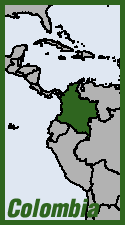 2009 saw both a significant advance and retreat for a humane drug policy in Washington's two closest Drug War allies in Latin America. First in August—in a move that made few stateside headlines, and registered not a peep of protest from the Obama administration—Mexico's conservative President Felipe Calderón signed into law a bill decriminalizing "personal quantities" of all drugs.
2009 saw both a significant advance and retreat for a humane drug policy in Washington's two closest Drug War allies in Latin America. First in August—in a move that made few stateside headlines, and registered not a peep of protest from the Obama administration—Mexico's conservative President Felipe Calderón signed into law a bill decriminalizing "personal quantities" of all drugs.
Mexico's Congress three years earlier had passed a bill decriminalizing possession of small amounts of drugs but, following pressure from the US, then-President Vicente Fox vetoed the legislation.
What constitutes "personal quantities" under the new law is left to the discretion of the judge, but maximums are set at five grams of cannabis (about four joints), a half gram of cocaine (about four lines), 50 milligrams of heroin, 40 milligrams for methamphetamine and 0.015 milligrams for LSD. (Time, Aug. 26; AP, Aug. 21, World War 4 Report, April 16, 2009)
The move came after years of debate in the face of fast-escalating violence and militarization in Mexico's Drug War, and growing fears of what commentators call the "Colombianization" of Mexico. As 2009 began, Mexico's ex-president Ernesto Zedillo joined with Colombia's ex-president César Gaviria to issue a public statement that the Washington-led Drug War has failed and that a new approach is needed. Released by the Latin American Commission on Drugs and Democracy, the report was entitled "Drugs and Democracy: Toward a Paradigm Shift." It stated: "Prohibitionist policies based on the eradication of production and on the disruption of drug flows as well as on the criminalization of consumption have not yielded the expected results. We are farther than ever from the announced goal of eradicating drugs." (World War 4 Report, Feb. 26, 2009)
 Ironically, just as Calderón was coming to accept decrim as an inevitability, his Colombian counterpart Alvaro Uribe was pushing a measure to have drugs recriminalized. Because criminalization of personal quantities had been ruled unconstitutional by Colombia's supreme court in 1994, Uribe's move required a constitutional amendment. Despite strong opposition from his own Prosecutor General Mario Iguarán and other leading figures of Colombia's political establishment, Uribe succeeded in winning congressional approval for the amendment in December. (Transnational Institute, Jan. 10, 2010; Colombia Reports, Dec. 10, 2009)
Ironically, just as Calderón was coming to accept decrim as an inevitability, his Colombian counterpart Alvaro Uribe was pushing a measure to have drugs recriminalized. Because criminalization of personal quantities had been ruled unconstitutional by Colombia's supreme court in 1994, Uribe's move required a constitutional amendment. Despite strong opposition from his own Prosecutor General Mario Iguarán and other leading figures of Colombia's political establishment, Uribe succeeded in winning congressional approval for the amendment in December. (Transnational Institute, Jan. 10, 2010; Colombia Reports, Dec. 10, 2009)
The move was predictably hailed by Colombia's National Police, with public security director Gen. Orlando Paez Baron stressing the importance of the "fight against micro-traffickers." However, Colombia's Constitutional Court is still reviewing the measure. On March 22, Uribe announced that pending a decision on the penalty for carrying a "personal dose," police will for now only be permitted to confiscate drugs rather than make an arrest. (Colombia Reports, March 22)
The move nonetheless represents a victory for the hardline Uribe—and a retrogression for Colombia's tokers. Just as the "Colombianization" of Mexico has prompted even the conservative Calderón—who has mobilized thousands of army troops throughout the country to fight the narco gangs—to embrace decrim, Colombia itself has taken a big step back towards an increasingly discredited enforcement model.







Recent comments
3 weeks 5 days ago
4 weeks 3 days ago
14 weeks 3 days ago
18 weeks 4 days ago
19 weeks 4 days ago
19 weeks 4 days ago
40 weeks 5 days ago
44 weeks 6 days ago
46 weeks 3 days ago
46 weeks 4 days ago